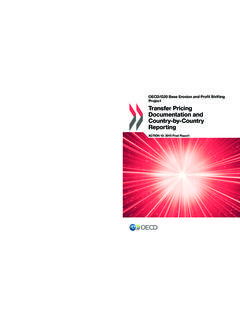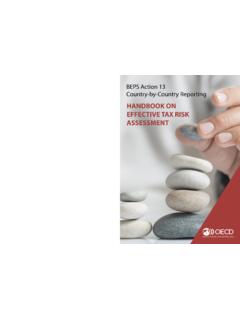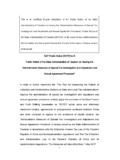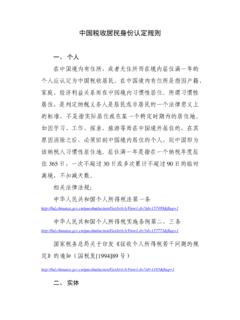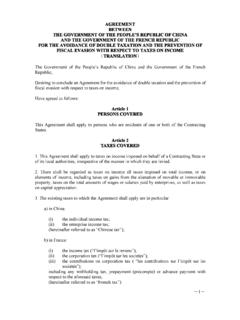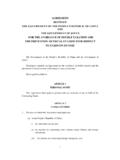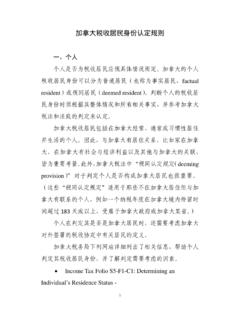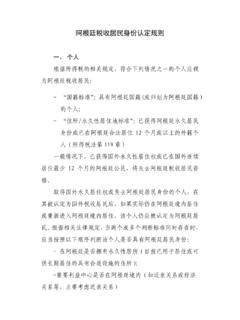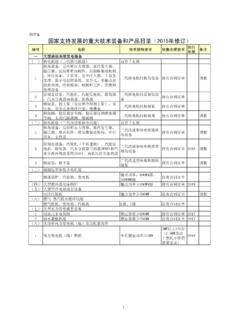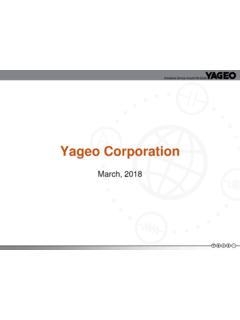Transcription of AGREEMENT BETWEEN THE GOVERNMENT OF …
1 1 AGREEMENT BETWEEN THE GOVERNMENT OF THE PEOPLE S REPUBLIC OF CHINA AND THE GOVERNMENT OF THE united STATES OF AMERICA FOR THE AVOIDANCE OF DOUBLE TAXATION AND THE PREVENTION OF FISCAL EVASION WITH RESPECT TO TAXES ON INCOME The GOVERNMENT of the People s Republic of China and the GOVERNMENT of the united States of America; Desiring to conclude an AGREEMENT for the avoidance of double taxation and the prevention of tax evasion with respect to taxes on income; Have agreed as follows: ARTICLE 1 PERSONAL SCOPE This AGREEMENT shall apply to persons who are residents of one or both of the Contracting States. ARTICLE 2 TAXES COVERED 1. The taxes to which this AGREEMENT applies are (a) in the People s Republic of China: (i) the individual income tax; (ii) the income tax concerning joint ventures with Chinese and foreign investment; (iii) the income tax concerning foreign enterprises; 2(iv) the local income tax.
2 (hereinafter referred to as Chinese tax ) . (b) in the united States of America: the Federal income taxes imposed by the Internal Revenue Code. (hereinafter referred to as united States tax ) 2. The AGREEMENT shall apply also to any identical or substantially similar taxes which are imposed after the date of signature of the AGREEMENT in addition to, or in place of, those referred to in paragraph 1. Within an appropriate time period, the competent authorities of the Contracting States shall notify each other of any substantial changes which have been made in their respective taxation laws. ARTICLE 3 GENERAL DEFINITIONS 1. In this AGREEMENT unless the context otherwise requires, (a) the term the People s Republic of China , when used in a geographical sense, means all the territory of the People s Republic of China, including its territorial sea, in which the laws relating to Chinese tax are in force, and all the area beyond its territorial sea, including the seabed and subsoil thereof, over which the People s Republic of China has jurisdiction in accordance with international law and in which the laws relating to Chinese tax are in force.
3 (b) the term united States of America , when used in a geographical sense, means all the territory of the united States of America, including its territorial sea, in which the laws relating to united States tax are in force, and all the area beyond its territorial sea, including the seabed and subsoil thereof, over which the united States of America has jurisdiction in accordance with international law and in which the laws relating to united States tax are in force; (c) the terms a Contracting State and the other Contracting State mean the People s Republic of China or the united States of America, as the context requires; (d) the term tax means Chinese tax or united States tax, as the context requires; 3(e) the term person includes an individual, a company, a partnership and any other body of persons; (f) the term company means any body corporate or any entity which is treated as a body corporate for tax purposes; (g) the terms enterprise of a Contracting State and enterprise of the other Contracting State mean respectively an enterprise carried on by a resident of a Contracting State and an enterprise carried on by a resident of the other Contracting State; (h) the term nationals means all individuals having the nationality of a Contracting State and all legal persons, partnerships and other bodies of persons deriving their status as such from the law in force in a Contracting State.
4 (i) the term competent authority means (i) in the People s Republic of China, the Ministry of Finance or its authorized representative; and (ii) in the united States of America, the Secretary of the Treasury or his authorized representative. 2. As regards the application of the AGREEMENT by a Contracting State any term not defined therein shall, unless the context otherwise requires, have the meaning which it has under the laws of that Contracting State concerning the taxes to which the AGREEMENT applies. ARTICLE 4 RESIDENT 1. For the purposes of this AGREEMENT , the term resident of a Contracting State means any person who, under the laws of that Contracting State, is liable to tax therein by reason of his domicile, residence, place of head office, place of incorporation or any other criterion of a similar nature.
5 2. Where by reason of the provisions of paragraph 1 an individual is a resident of both Contracting States, then the competent authorities of the Contracting States shall determine through consultations the Contracting State of which that individual shall be deemed to be a resident for the purposes of this AGREEMENT . 43. Where by reason of the provisions of paragraph 1 a company is a resident of both Contracting States, then the competent authorities of the Contracting States shall determine through consultations the Contracting State of which the company shall be deemed to be a resident for the purposes of this AGREEMENT , and, if they are unable to so determine, the company shall not be considered to be a resident of either Contracting State for purposes of enjoying benefits under this AGREEMENT .
6 4. Where by reason of the provisions of paragraph 1 a company is a resident of the united States of America, and, under a tax AGREEMENT BETWEEN the People s Republic of China and a third country is also a resident of that third country, the company shall not be considered to be a resident of the united States of America for purposes of enjoying benefits under this AGREEMENT . ARTICLE 5 PERMANENT ESTABLISHMENT 1. For the purposes of this AGREEMENT , the term permanent establishment means a fixed place of business through which the business of an enterprise is wholly or partly carried on. 2. The term permanent establishment includes especially: (a) a place of management; (b) a branch; (c) an office; (d) a factory; (e) a workshop; and (f) a mine, an oil or gas well, a quarry, or any other place of extraction of natural resources.
7 3. The term permanent establishment also includes: (a) a building site, a construction, assembly or installation project, or supervisory activities in connection therewith, but only where such site, project or activities continue for a period of more than six months; 5(b) an installation, drilling rig or ship used for the exploration or exploitation of natural resources, but only if so used for a period of more than three months; and (c) the furnishing of services, including consultancy services, by an enterprise through employees or other personnel engaged by the enterprise for such purpose, but only where such activities continue (for the same or a connected project) within the country for a period or periods aggregating more than six months within any twelve month period.
8 4. Notwithstanding the provisions of paragraphs 1 through 3, the term permanent establishment shall be deemed not to include: (a) the use of facilities solely for the purpose of storage, display or delivery of goods or merchandise belonging to the enterprise; (b) the maintenance of a stock of goods or merchandise belonging to the enterprise solely for the purpose of storage, display or delivery; (c) the maintenance of a stock of goods or merchandise belonging to the enterprise solely for the purpose of processing by another enterprise; (d) the maintenance of a fixed place of business solely for the purpose of purchasing goods or merchandise, or of collecting information, for the enterprise; (e) the maintenance of a fixed place of business solely for the purpose of carrying on, for the enterprise, any other activity of a preparatory or auxiliary character; (f) the maintenance of a fixed place of business solely for any combination of the activities mentioned in sub-paragraphs (a) through (e), provided that the overall activity of the fixed place of business resulting from this combination is of a preparatory or auxiliary character.
9 5. Notwithstanding the provisions of paragraphs 1 and 2, where a person, other than an agent of an independent status to whom paragraph 6 applies, is acting on behalf of an enterprise and has and habitually exercises in a Contracting State an authority to conclude contracts in the name of the enterprise, that enterprise shall be deemed to have a permanent establishment in that Contracting State in respect of any activities which that person undertakes for the enterprise, unless the activities of such person are limited to those mentioned in paragraph 4 which, if exercised through a fixed 6place of business, would not make this fixed place of business a permanent establishment under the provisions of that paragraph. 6. An enterprise of a Contracting State shall not be deemed to have a permanent establishment in the other Contracting State merely because it carries on business in that other Contracting State through a broker, general commission agent or any other agent of an independent status, provided that such persons are acting in the ordinary course of their business.
10 However, when the activities of such an agent are devoted wholly or almost wholly on behalf of that enterprise, he will not be considered an agent of an independent status within the meaning of this paragraph if it is shown that the transactions BETWEEN the agent and the enterprise were not made under arm s-length conditions. 7. The fact that a company which is a resident of a Contracting State controls or is controlled by a company which is a resident of the other Contracting State, or which carries on business in that other Contracting State (whether through a permanent establishment or otherwise), shall not of itself constitute either company a permanent establishment of the other. ARTICLE 6 INCOME FROM IMMOVABLE PROPERTY 1.
